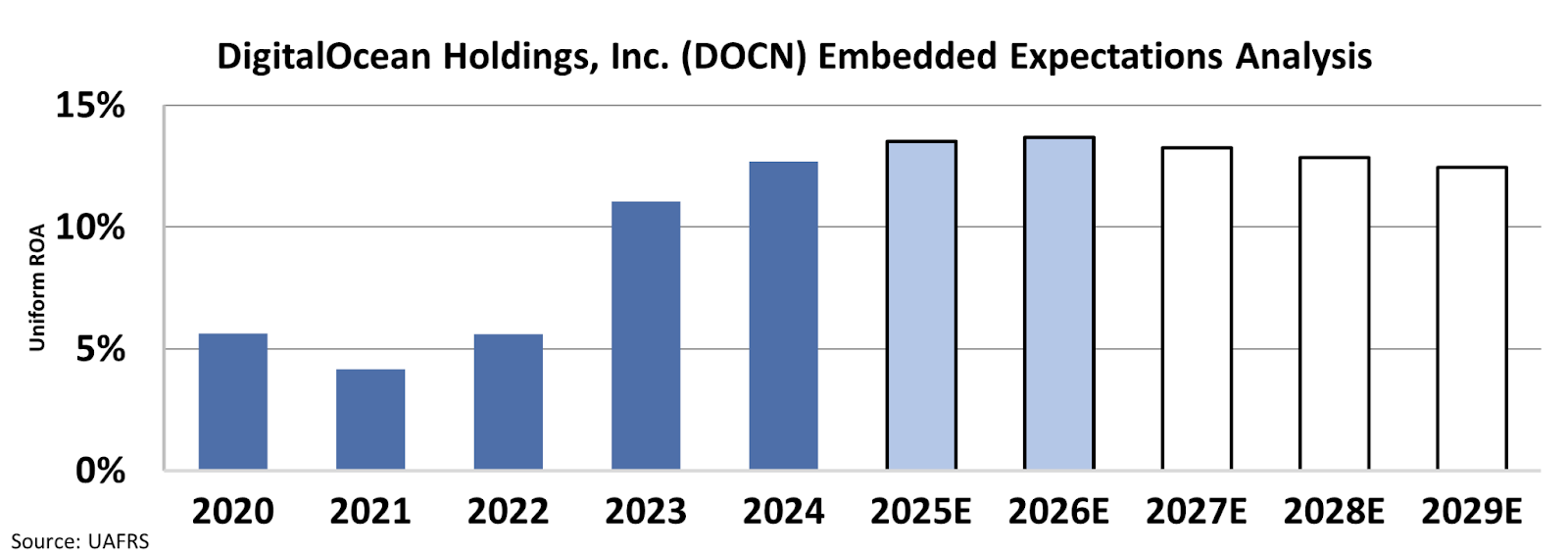Despite its steady growth, improved profitability, and expansion to AI, this cloud infrastructure provider may still be undervalued

Over the past few years, the cloud infrastructure market has grown considerably, with cloud service revenues forecasted to exceed $400 billion this year.
Cloud infrastructure has become indispensable in today’s digitally-reliant business landscape as it enables businesses to store and access data remotely through the cloud, saving on physical infrastructure costs.
Currently, Amazon Web Services, Microsoft Azure, and Google Cloud, hold more than 60% of cloud infrastructure market share. Even though these platforms dominate both the market and its enterprise segment, this doesn’t mean they are the only service providers who are thriving.
DigitalOcean (DOCN) has carved out a place for itself in a highly concentrated market by servicing an untapped segment. This cloud infrastructure provider specializes in serving startups, individual developers, and small to medium-sized businesses.
Despite growing its business, improving its profitability over the past few years, and recently, expanding its solutions to cover AI-related cloud computing needs, this company may still be undervalued.
Investor Essentials Daily:
Thursday News-based Update
Powered by Valens Research
Cloud computing has become indispensable in today’s tech-driven and digitally-reliant business landscape as it enables enterprise customers to store and access data remotely through the cloud.
This technology is useful and cost-effective because it eliminates the need for businesses to physically build their own servers. Instead, they can access and store their data remotely by paying cloud computing platforms.
Over the past few years, the cloud infrastructure market has grown considerably, with cloud service revenues forecasted to exceed $400 billion this year.
Three major platforms currently dominate this growing market, collectively holding more than 60% of total market share. Amazon Web Services (AWS) holds 30% of total market share, followed by Microsoft Azure and Google Cloud at 20% and 13%, respectively.
While these platforms are the clear leaders in this market and its enterprise segment, there are still opportunities for other players to thrive.
DigitalOcean (DOCN) has carved out a place for itself in a highly concentrated market by servicing an untapped segment. This cloud infrastructure provider specializes in serving startups, individual developers, and small to medium-sized businesses (“SMBs”).
DigitalOcean, through its “droplet” virtual machine offering, enables customers to create servers that they can use to run applications, host websites, or store data without having to rely on physical servers.
These droplets can be upgraded with additional volume as a business grows and needs more computing power. And the company’s “Spaces” products offer customers scalable data storage options.
Aside from these core offerings, the company provides a host of other solutions tailored for web and mobile applications, ecommerce, website hosting, machine learning, data analytics, managed services, and others.
DigitalOcean primarily services startups that need to scale without a big overhead, developers working on independent projects, and SMBs that want to run simple and reliable cloud infrastructure without the complexity and cost of enterprise-grade platforms.
As such, the company has built its products around ease of use, with different offerings being optimized for specific use cases like memory optimization or CPU-heavy workloads.
Recently, the company launched its own generative artificial intelligence (“AI”) platform that enables customers to build and launch AI tools and agents without needing expertise in AI or machine learning.
Since its founding in 2012, DigitalOcean has steadily expanded its business through a combination of product development and acquisitions of companies like Cloudways (a cloud hosting provider for SMBs) in 2022 and Paperways (a provider of cloud infrastructure for applications leveraging GPUs) in 2023.
Moves like these have helped the company grow its revenue from $318 million in 2020 to $781 million in 2024. DigitalOcean’s growth momentum is carrying over into 2025 as well, with the company generating $833 million in sales over the past twelve months.
As the company has gained scale, it has reached a critical mass which has translated into profitability. From 2020 through 2024 the company’s operating profits have steadily improved from negative $42 million to $112 million today.
Despite these positive trends, the company appears undervalued.
We can see what the market thinks through our Embedded Expectations Analysis (“EEA”) framework.
The EEA starts by looking at a company’s current stock price. From there, we can calculate what the market expects from the company’s future cash flows. We then compare that with our own cash-flow projections.
In short, it tells us how well a company has to perform in the future to be worth what the market is paying for it today.
Since 2021, DigitalOcean’s Uniform return on assets (“ROA”) has risen from 4% to 12% as its business has grown. Wall Street analysts expect DigitalOcean’s returns to continue climbing in the coming years, reaching 13% by 2026. However, the market thinks ROA will decline slightly by 2029.
DigitalOcean’s business model of servicing developers, startups, and SMBs has demonstrated both its profitability and viability in a competitive market.
If the company can sustain its recent ascent, and if its expansion into AI pays off, it could provide significant upside to investors seeking under-the-radar opportunities in fast-growing markets.
Best regards,
Joel Litman & Rob Spivey
Chief Investment Officer &
Director of Research
at Valens Research

